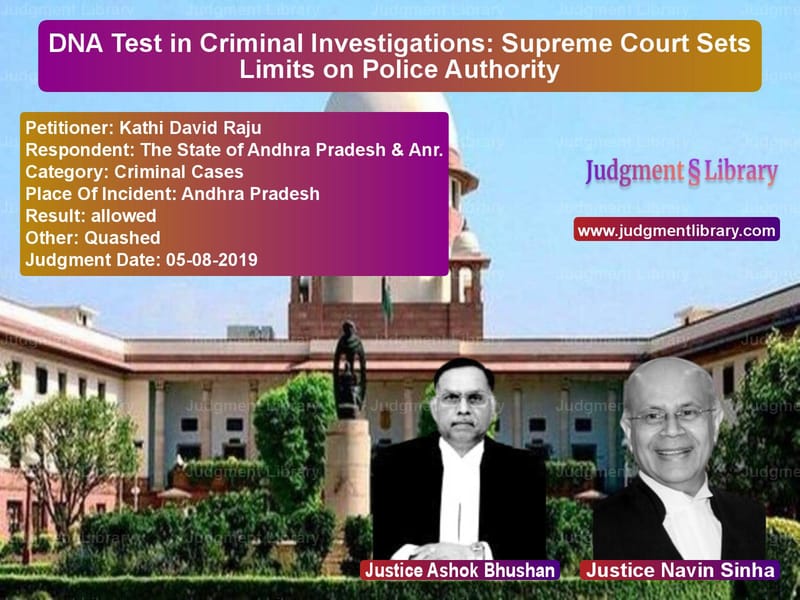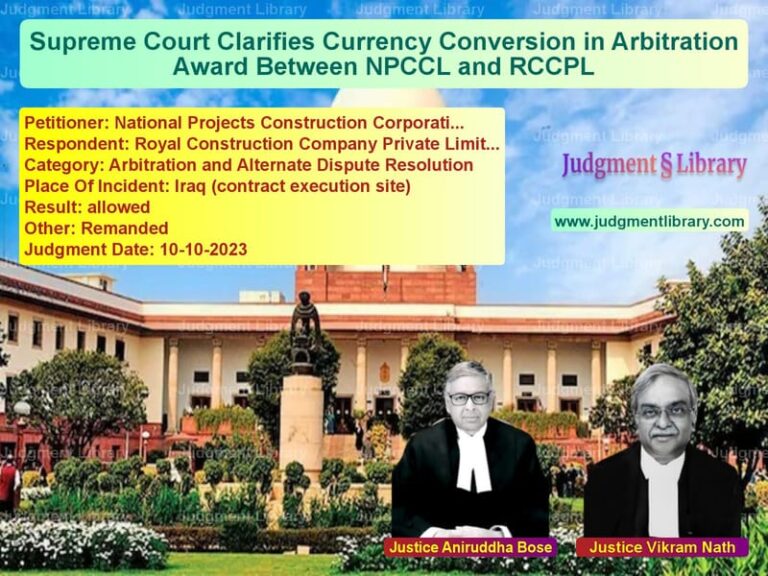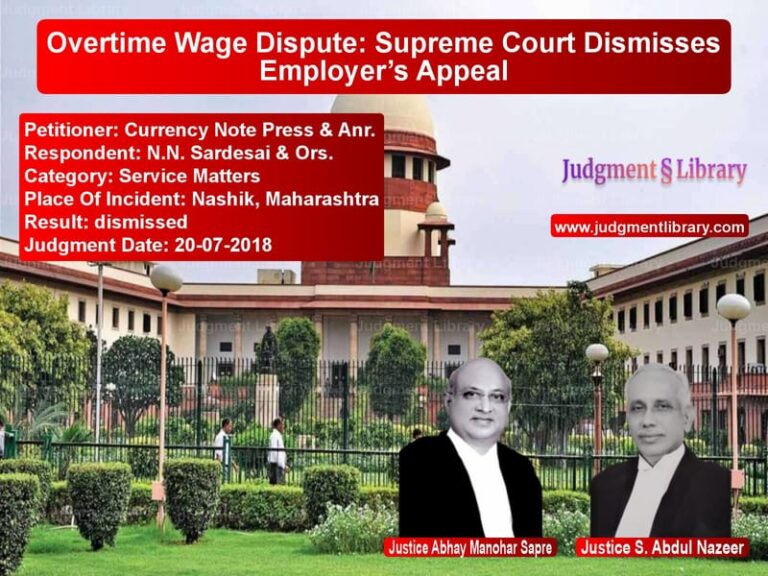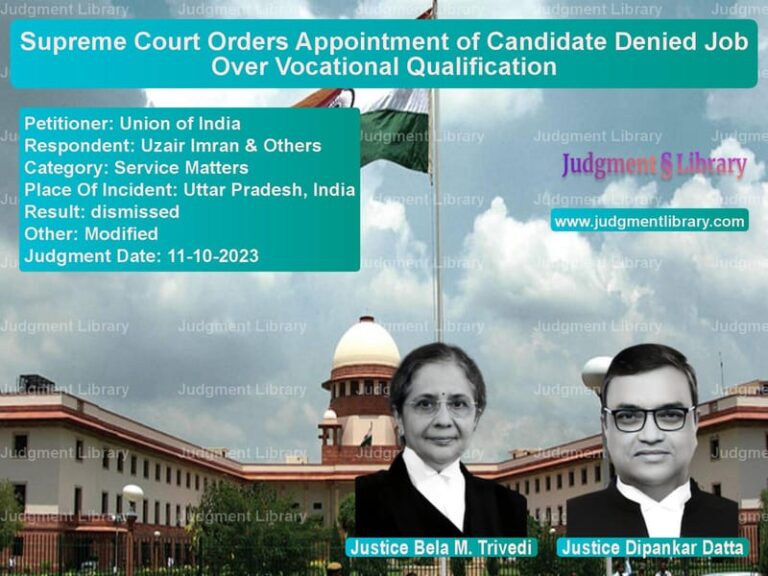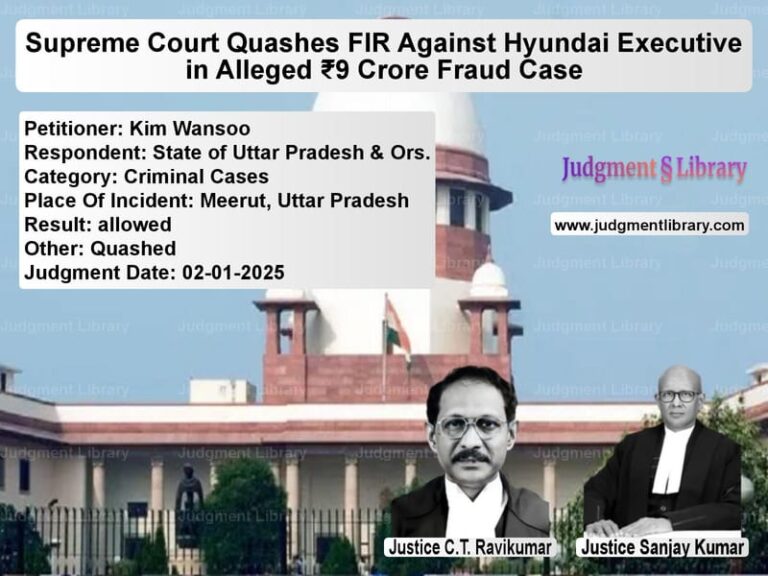DNA Test in Criminal Investigations: Supreme Court Sets Limits on Police Authority
The Supreme Court of India recently ruled in the case of Kathi David Raju vs. The State of Andhra Pradesh & Anr., addressing the controversial issue of DNA testing in criminal investigations. The case revolved around a challenge to a judicial order permitting DNA testing of a suspect and his family members in a case involving allegations of false caste certification.
Background of the Case
The appellant, Kathi David Raju, was accused of fraudulently obtaining a Scheduled Caste (SC) certificate to secure government employment as an Additional Assistant Engineer in the VTPS Electricity Generation Corporation. A First Information Report (FIR) was filed on January 6, 2016, under Sections 465, 468, 471, and 420 of the Indian Penal Code (IPC). The complaint alleged that Raju, originally named Immadabathina Veeranjaneyulu and belonging to the ‘Telanga’ caste, had falsely assumed a new identity as ‘Kathi David Raju’ of the ‘Yanadi’ caste.
On January 13, 2016, while Raju was in judicial custody, the police filed an application before the Additional Junior Civil Judge, Bapatla, seeking permission to conduct a DNA test on Raju, his mother, and his two brothers to verify his caste identity. The court allowed the request on January 22, 2016. Raju challenged the order by filing an application under Section 482 of the Code of Criminal Procedure (CrPC) in the Andhra Pradesh High Court, seeking to quash the directive. However, the High Court upheld the order, leading Raju to appeal before the Supreme Court.
Key Legal Issues
- Whether the police could request DNA testing at an early stage of the investigation without substantial evidence.
- Whether the magistrate’s order permitting DNA testing was justified.
- Whether ordering a DNA test violated Raju’s fundamental rights, particularly his right to privacy.
Arguments by the Appellant (Kathi David Raju)
The appellant’s counsel argued:
- The police had not completed a thorough investigation before requesting a DNA test.
- The request was based on mere allegations without sufficient evidence.
- The FIR was lodged by an individual with personal animosity towards Raju.
- There were existing legal mechanisms under the Andhra Pradesh (SC, ST, and BCs) Regulation of Issue of Community Certificates Act, 1993, for verifying caste claims.
- Allowing a DNA test in this case would set a dangerous precedent, allowing intrusive bodily testing without proper justification.
Arguments by the Respondents (State of Andhra Pradesh)
The prosecution countered:
- The FIR alleged that Raju had forged a caste certificate and used it to gain employment, necessitating a thorough inquiry.
- The police had sufficient grounds to suspect that Raju had changed his name and caste fraudulently.
- Section 53 of the CrPC allowed police to request medical examinations, including DNA testing, if it could aid the investigation.
- The magistrate had exercised due diligence before granting permission for the DNA test.
Supreme Court’s Observations
1. Prematurity of DNA Testing
The Court criticized the police for prematurely seeking a DNA test without conducting substantial investigations. It observed:
“The investigation was at an initial stage, and the authorities had not yet gathered sufficient material to justify a DNA test. Allowing such a request without substantive evidence would amount to a roving and fishing inquiry.”
2. No Blanket Authority for DNA Testing
The Court emphasized that while Section 53 of the CrPC allows medical examinations, it does not provide an unrestricted right to conduct DNA tests:
“A magistrate must ensure that the necessity for DNA testing is backed by strong evidence and is not used indiscriminately.”
3. Protection of Individual Rights
The Court underlined the importance of protecting individuals from unnecessary bodily intrusion:
“The right to privacy, though not absolute, must be weighed against the necessity of investigation. The fundamental rights of individuals must not be overridden without compelling justification.”
4. Investigative Lapses
The Court noted that the police had failed to first verify the documentary evidence related to Raju’s caste before opting for DNA testing:
“Had the police exhausted alternative investigative means, including document verification and witness testimonies, and still found contradictions, a DNA test might have been justified. However, in the present case, such an approach was not followed.”
Final Verdict
The Supreme Court ruled:
- The order of the Additional Junior Civil Judge, Bapatla, permitting DNA testing was quashed.
- The Andhra Pradesh High Court’s decision was set aside.
- The police were directed to complete their investigation through conventional means before considering any intrusive forensic tests.
- The police could seek a fresh DNA test only if sufficient material evidence justified it.
Conclusion
This judgment establishes an important precedent regarding the use of DNA testing in criminal investigations. It ensures that such invasive procedures are not ordered lightly and that law enforcement agencies must first conduct thorough preliminary inquiries before seeking forensic evidence. The ruling safeguards individual rights while balancing the needs of criminal justice.
Petitioner Name: Kathi David Raju.Respondent Name: The State of Andhra Pradesh & Anr..Judgment By: Justice Ashok Bhushan, Justice Navin Sinha.Place Of Incident: Andhra Pradesh.Judgment Date: 05-08-2019.
Don’t miss out on the full details! Download the complete judgment in PDF format below and gain valuable insights instantly!
Download Judgment: Kathi David Raju vs The State of Andhra Supreme Court of India Judgment Dated 05-08-2019.pdf
Direct Downlaod Judgment: Direct downlaod this Judgment
See all petitions in Fraud and Forgery
See all petitions in SC/ST Act Case
See all petitions in Judgment by Ashok Bhushan
See all petitions in Judgment by Navin Sinha
See all petitions in allowed
See all petitions in Quashed
See all petitions in supreme court of India judgments August 2019
See all petitions in 2019 judgments
See all posts in Criminal Cases Category
See all allowed petitions in Criminal Cases Category
See all Dismissed petitions in Criminal Cases Category
See all partially allowed petitions in Criminal Cases Category

